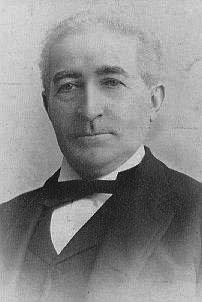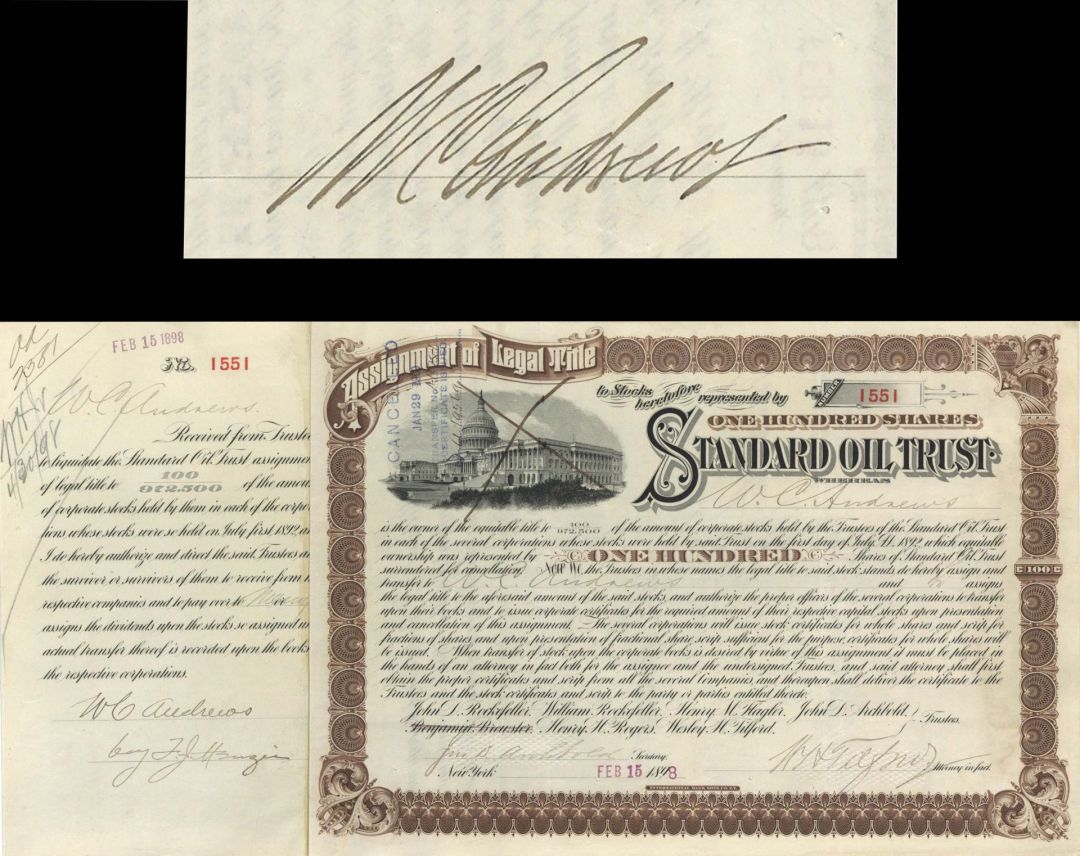 Standard Oil Trust signed by W.C. Andrews, John D. Archbold and W.H. Tilford - 1898 dated Autographed Stock Certificate
Standard Oil Trust signed by W.C. Andrews, John D. Archbold and W.H. Tilford - 1898 dated Autographed Stock Certificate
Inv# AG2875
Autograph
Stock issued to and signed by W.C. Andrews on back. Signed by Jon. D. Archbold as secretary and W.H. Tilford attorney on front.

Wallace Corydon Andrews was born in Vienna, Ohio 17 June 1833. He was one of the original directors of the Standard Oil Company, and in 1879 became President of the New York Steam Company. The steam heating industry was still in its infancy, and the challenges of introducing the system to a city as large as New York seemed almost insurmountable. Yet Wallace C. Andrews decided to take on that challenge. He acquired franchise and license rights to deploy the Holly system, and incorporated the Steam Heating and Power Company of New York in 1879. Andrews acquired a competing firm that was formed in 1880, the New York Steam Company, and the two companies consolidated in 1881 under the latter name. The company built by Wallace Andrews was to go on to even greater success during the 20th century, but he was not to see it. During the night of April 7, 1899, Andrews and much of his family perished in a house fire. His brother-in-law, G.C. St. John, who was out of town when the tragic fire occurred, was made president of the company and guided it for more than a decade during a prolonged legal battle over Andrews' will.

John Dustin Archbold (born July 26, 1848, in Leesburg, Ohio; died December 6, 1916, in Tarrytown, New York) was a prominent American capitalist and one of the pioneering oil refiners in the United States. His modest oil enterprise was acquired by John D. Rockefeller's Standard Oil Company. Archbold quickly advanced within Standard Oil, managing numerous intricate and confidential negotiations throughout the years. By 1882, he had become Rockefeller's closest confidant and frequently served as the company's principal spokesperson. Following 1896, Rockefeller delegated business responsibilities to Archbold as he focused on his philanthropic endeavors; as vice president, Archbold effectively oversaw the operations of Standard Oil until his passing in 1916. Influenced by Rockefeller's strategies, Archbold prioritized stabilization, efficiency, and the reduction of waste in the refining and distribution of petroleum products. In 1911, the Supreme Court mandated the dissolution of the company into approximately thirty-six smaller entities, after which Archbold assumed the presidency of the largest, Standard Oil of New Jersey.

Wesley H. Tilford (1850-1909) was born on July 14, 1850, in Lexington, Kentucky. He attended Columbia College for a brief period; however, the allure of the business world compelled him to abandon his pursuit of a bachelor's degree. Drawn by the potential of the petroleum industry, Wesley left his studies and took a position as a clerk at his brother's firm, Bostwick & Tilford, located on Pearl Street. Following the dissolution of the firm, the brothers established their own partnership under the name John B. Tilford Jr. & Co., which experienced immediate success and continued to thrive. Eventually, during the era of Eastern oil consolidations, they received a lucrative offer from the Standard Oil Company, prompting them to align their interests with this dynamic organization. These were indeed pivotal times in the oil sector, and Wesley demonstrated his capabilities through a highly successful trip to the Pacific Coast in 1878, where he played a key role in organizing the oil trade across California, Oregon, Colorado, and neighboring states.
Upon his return to the East, he was greeted with a prominent position within the home office, where he energetically and effectively addressed the extensive transportation challenges. With the respect and trust of his colleagues firmly established, he maintained this standing until the end of his career. Tilford, who served as one of the Vice Presidents of the Standard Oil Company, left behind a distinguished legacy of over thirty years with the Company, along with several years in a petroleum enterprise associated with his family. Throughout his career, he navigated all levels of petroleum merchandising, consistently demonstrating loyalty, integrity, and insight in each role he undertook. Prior to his promotion to Vice President in 1908, he served as Treasurer of the Standard Oil Company for nine years and had been a Director since 1892. Despite his extensive and notable career, he remained relatively unknown outside the oil industry due to his unassuming nature. He was a man of few words, yet possessed a profound understanding of business matters, particularly excelling in organizational skills and possessing sound judgment. Additionally, he was well-read and knowledgeable across various subjects. His demeanor was courteous, compassionate, and generous. While ordinary qualities, enhanced by business experience, may suffice for navigating the intricacies of an established enterprise, achieving and maintaining a leading position in a dynamic and expanding business requires exceptional attributes. His colleagues attested that he consistently merited his advancements, a commendation from individuals who themselves were contemporaries of the titans of business throughout history.











Ebay ID: labarre_galleries